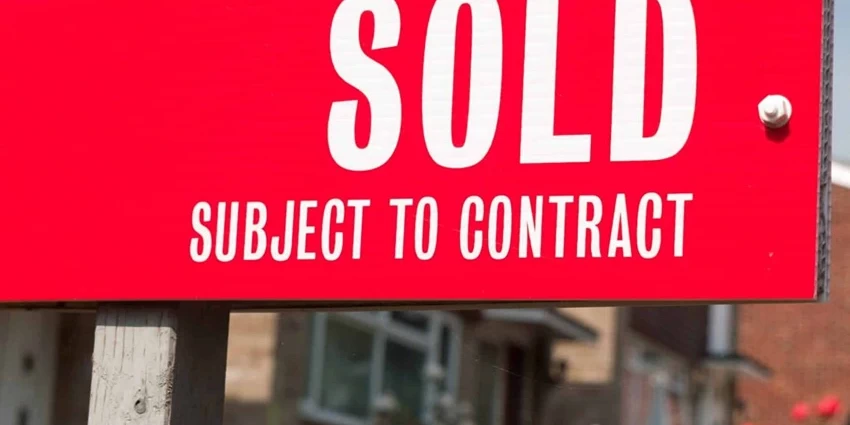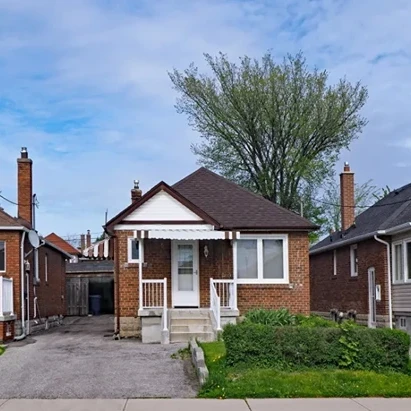Diving into the realms of UK property sales terminology, “Sold STC” is a term that frequently pops up, but what does it actually signify? Understanding the meaning of “Sold Subject to Contract” (STC) is pivotal for both buyers and sellers as it marks a critical juncture in the property transaction process – a midway point that is neither a handshake deal nor a finalised sale.

What Does “Sold STC” Actually Mean?
What is the definition of “Sold STC”?
“Sold STC” stands for “Sold Subject To Contract”. This term signifies that an offer on a property has been accepted by the seller, but the sale is not yet legally binding. Finalisation of the sale is contingent upon the successful completion of certain contractual terms.
How is “Sold STC” different from “Under Offer” or “Sold”?
While “Under Offer” suggests a property has received an offer that the seller is considering, “Sold STC” indicates the seller has actually accepted the offer, but the transaction is not formalised as the contractual details are still being ironed out.
Once the sale progresses beyond STC, it reaches the “Sold” stage where contracts are exchanged, making the sale legally binding.
To grasp the UK property sales terminology better and understand the nuances between these terms, consider visiting this detailed explanation on Sold Subject To Contract.
In summary, “Sold STC” is an important stage in property transactions in the UK. It signifies a commitment has been made between buyer and seller, albeit without the legal heaviness of a final sale. Mind the difference between terms such as “Under Offer” and “Sold” to navigate your property sale or purchase with confidence.
What Are the Implications of “Sold STC” for Sellers?
Understanding the implications of “Sold STC” is crucial if you’re selling your property. “STC” stands for “Subject to Contract”, which indicates that an offer on a property has been accepted, but the sale isn’t legally binding until the contracts are exchanged. Here’s what you need to know:
The Seller’s Obligations During the “Sold STC” Phase
- You are effectively agreeing not to enter into a contract with another buyer while the transaction is in progress. It’s a sort of gentleman’s agreement.
- You should continue to work with the buyer to move towards contract exchange, providing all necessary documentation and answering any queries. For instance, understanding the importance of ID1 forms can be crucial during this phase. These forms verify the identity of individuals involved in property transactions, ensuring that all parties are legitimate and reducing the risk of fraud. Properly completing and submitting ID1 forms can streamline the process and help move towards a successful contract exchange.
Can the Seller Accept Other Offers While “Sold STC”?
- Legally, yes, you can still accept other offers.
- Morally, it is disputed, and could damage your reputation or the sale itself if handled poorly.
- If you’re considering accepting another offer, typically known as ‘gazumping’, you should consult your estate agent or legal advisor. It’s a delicate situation that must be approached with care.
What does this mean for you?
During the “Sold STC” period, you have a moral responsibility to the buyer to head towards completion of the sale without engaging with other prospective buyers. However, until contracts are signed, the deal is not legally binding, giving you a degree of flexibility should another, better offer come in.
For more detailed information, explore Petty Son and Prestwich’s guide to “Sold STC” and the responsibilities it entails.
Remember, this phase is a precursor to the final, binding contract. Navigating it with transparency and good faith might speed along the process and prevent any last-minute hurdles.
How Should Buyers Navigate a “Sold STC” Property?
When you’re eyeing up a property and you see “Sold STC” attached to it, what does it mean for you as a potential buyer?
Understanding the sold STC meaning for buyers is crucial in deciding your next move.
- What “Sold STC” means for a potential buyer:
- STC stands for ‘Subject to Contract’, which essentially signifies an agreement between the seller and a buyer.
- The sale isn’t completed yet; both parties have yet to exchange legally binding contracts.
- It indicates a provisional agreement subject to certain conditions such as a survey and mortgage approval.
- This stage doesn’t forever lock a property away from other interested parties, which leads to the next point.
What are the risks of gazumping in the “Sold STC” stage?
Gazumping occurs when a seller accepts a higher offer from a new buyer, despite having a handshake deal or initial agreement with another. This can happen because, until the exchange of contracts, the sale agreement remains non-binding. As a buyer, here’s what you need to know:
- Gazumping is legal in Scotland, so be aware that your offer being accepted doesn’t mean the property is yours until the missives are concluded.
- The property remains on the market, and sellers could accept a better offer that comes along post-STC. Additionally, understanding squatters rights in Scotland is essential, especially if the property has been vacant for a while. Squatters rights can complicate the sale process, and being aware of these laws can help you take necessary precautions to protect your property from unauthorized occupation.
- While your agreement is ‘subject to contract’, remain proactive. Speed up your side of processes like mortgage arrangements and conveyancing.
What is the chance of a house ‘Sold Subject to Contract’ not being sold?
To mitigate the risks:
- Establish good communication with the estate agent and seller for updates.
- Consider taking out insurance against gazumping for peace of mind.
- While gazumping isn’t commonplace, it’s a factor to bear in mind during the ‘Sold STC’ stage.
Be informed, be prepared, and act decisively if you find yourself considering buying a house sold STC. Your dream home could still be within reach, but it pays to understand the game rules in the property market.

What Happens After a Property is Marked as “Sold STC”?
Once a property is marked as “Sold STC” (Sold Subject to Contract), you’re entering the home stretch of selling your home. But what exactly happens during this critical phase, and how does the conveyancing process play into it? Let’s break it down step-by-step to understand the journey from “Sold STC” to the final completion of the sale.
The Conveyancing Process Post-STC
The moment your property gets the “Sold STC” label, the detailed and crucial process of conveyancing begins. Here’s how it typically unfolds:
- Drafting the Contract: Your solicitor or conveyancer will start by preparing a draft contract. This legal document outlines the sale’s terms, including the price, boundaries, fixtures and fittings, and any planning restrictions.
- Enquiries and Searches: Next, the buyer’s solicitor will carry out a series of legal checks and searches to uncover any issues that might affect the property’s value or future use.
- Mortgage Offer and Survey: Parallel to the legal checks, if the buyer needs a mortgage, their lender will require a survey to be done on the property to ensure it’s worth the investment.
- Exchange of Contracts: Once everyone’s happy and all enquiries have been satisfied, contracts are formally exchanged. From this point, the agreement becomes legally binding for both buyer and seller. Breaking the contract can involve heavy penalties.
- Final Steps to Completion: After a successful exchange of contracts, there’s a short period (typically between 1-4 weeks, but this can vary) to allow for any final preparations. These might include arranging moves, finalising the mortgage deal, and setting up utility services.
- Completion Day: On the agreed completion day, the legal ownership transfers from you to the buyer. The keys are handed over, and the property officially has a new owner.
Throughout this post-STC phase, conveyancing is integral. It not only involves the intricate legalities of transferring property ownership but also ensures that all parties’ interests are respected and protected.
The conveyancing process can be a minefield of legal jargon and complex regulations. By understanding the steps from “Sold STC” to completion, you ready yourself for what’s to come and minimise any surprises along the way. Remember, each stage is designed to inch you closer to the successful sale of your property, and with the right advice and guidance, it’s a manageable journey.
Is a “Sold STC” Status Legally Binding?
Is “Sold STC” legally binding? No, it’s not. “Sold STC” stands for “Sold Subject to Contract,” which signifies that the seller has accepted an offer from a buyer, but the legal transfer of property ownership has not yet occurred.
This phase in the property transaction process is a declaration of intent rather than a legally enforced agreement. Let’s delve into what this means for both parties involved.
- Understanding the legal standing of “Sold STC”.
“Sold STC” is an important milestone in property transactions, showing that both buyer and seller have agreed on a price. However, during this stage, the deal is not secured by a legal contract.
Until the exchange of contracts happens, the agreement remains non-binding. This is particularly relevant when dealing with different property types. For instance, understanding the benefits and implications of freehold property types can influence your decision-making process. Freehold properties offer more control and fewer restrictions compared to leasehold properties, which can be an attractive option for many buyers. Knowing the distinctions can help you better navigate the ‘Sold STC’ phase and make informed choices. - The difference between “Sold STC” and exchange of contracts.
The exchange of contracts is a pivotal moment where both parties are legally committed to the transaction. At this point, the buyer and seller sign legal documents that formalise the sale. Unlike the “Sold STC” stage, once contracts are exchanged, backing out could lead to serious legal and financial consequences for either party.
Remember, “Sold STC” simply means there’s an accepted offer, but it’s during the conveyancing process where things become legally binding. Be aware, it’s not uncommon for transactions to fall through even after a property is listed as “Sold STC”. It’s perhaps the time when you should be cautiously optimistic, but also realistic about the non-legally binding nature of this agreement. Visit Sold.co.uk to understand more intricacies of “Sold Subject to Contract”.
The “Sold STC” stage should be treated with due diligence as it’s a precursor to the formal, legally binding steps that will follow. Whether you’re buying or selling, it’s crucial to continue monitoring the process carefully and prepare for the next phase: exchange of contracts.

Can You Still View and Make Offers on “Sold STC” Listings?
Have you stumbled upon a dream property only to find it’s listed as “Sold STC” and wondered if you’re too late? Let’s clarify your chances and the etiquette when dealing with such listings.
- Viewing Properties Post-STC Status: Can buyers still view sold STC homes? Yes, you can still request to view a property after it’s marked “Sold STC,” but it’s less common. Sellers are typically focused on completing the sale with the interested party, and estate agents may advise against it to not disrupt the ongoing process. It’s best to express your interest to the estate agent; if the sale falls through, you could be next in line.
- Negotiating After a Property is “Sold STC”: Negotiating after a property reaches ‘sold subject to contract’ status can be delicate. The seller has accepted an offer, but until the exchange of contracts (according to Propertymark standards), other offers can still be considered. If you’re keen on the property, it’s not out of bounds to make a higher offer in hopes of it being accepted, but be aware this could result in a situation known as gazumping.
Remember, expressing your strong interest to the estate agent and having your finances in order can increase your chances if the original deal falls through. Be prepared to act quickly, and always communicate clearly and professionally.
What Are the Next Steps Once a Property is “Sold STC”?
Following a property’s designation as “Sold Subject to Contract” (STC), what exactly transpires? It’s a common question among both buyers and sellers. Once a property is marked as “Sold STC”, a vector of key events and processes must take place before the property legally changes hands. Here’s what to anticipate:
- The Conveyancing Process:
The conveyancing process is the tapestry of legal and administrative work necessary to transfer a property from one owner to another. Both parties will typically hire conveyancers or solicitors to navigate this intricate journey, which includes conducting property searches—a vital element to uncover any potential issues with the property. More about property searches can be found in this comprehensive guide on what searches happen when buying a house. - Property Exchange of Contracts:
Crucially, the exchange of contracts is a significant landmark where both buyer and seller are legally committed to the sale. It’s a step that typically occurs near the end of the conveyancing process, requiring a thorough revision and agreement of all contract terms. - Timeline and Key Milestones:
Drafting and reviewing contracts
Arranging property surveys
Obtaining mortgage offers
Exchanging contracts and paying the deposit
Planning for the moving day
Completing the sale and transferring ownership
- Preparing for Potential Roadblocks:
Anticipate and prepare for possible snags such as delayed mortgage offers, negative survey findings, or issues identified during the search process. Maintaining open communication lines with your conveyancer and estate agent, and staying flexible with timelines is essential.
Remember, the timeline from “Sold STC” to completion can vary widely and hinges on the complexity of the transaction, the responsiveness of all parties involved, and their individual circumstances. Your conveyancer will guide you through the steps and help you prepare for the crucial phase of signing contracts. That’s where your agreement evolves from a verbal understanding to a legally binding commitment.
How Can Sellers Protect Themselves During the “Sold STC” Phase?
When your property is marked as “Sold Subject to Contract” (STC), it’s pivotal to ensure that the steps leading to the completed deal are navigated carefully. Here’s how:
- Maintain Clear Communication with the Buyer
- Keep in regular contact to ensure both parties are on track with the expected timeline.
- Work Closely with Your Solicitor
- They can help you understand the conditions of the sale and assist in progressing to exchange and completion.
- Set a Deadline for Exchange of Contracts
- This can help to focus the minds of all parties on the urgency of the sale.
- Minimise the Risk of Gazumping
- Although rare, ensure prospective buyers are aware the property is under a serious offer to discourage this practice.
- Keep the Property Well-Maintained
- You want to ensure the property remains in the agreed-upon condition as at the time of the offer.
By implementing these strategies, you can bolster the advantages of sold STC for sellers, which signal a committed buyer and a locked-in offer. With due diligence, the transition from STC to a closed deal can be not merely a hope but an expectancy.
What Does “Sold STC” Mean in the Context of the Scottish Property Market?
When you delve into the property market in Scotland, you will notice some differences in how transactions are completed compared to the rest of the UK. “Sold STC,” stands for “Sold Subject to Contract.” The term is a common one in the UK property domain; however, its implications can be slightly different in Scotland due to distinct legal procedures involved in buying and selling properties.
Here’s what you need to know about “Sold STC” in Scotland:
- Scotland’s property purchase process is unique, involving a series of formal steps not found in other parts of the UK.
- Is “Sold STC” binding in Scotland? Technically, no. But let’s go into the details to understand what this means for you.
In Scotland, once an offer is accepted, the property is typically considered “Under Offer.” The term “Sold STC” is less common but still used and signifies that an offer has been accepted, but the missives (a Scottish term for the contractual documents) are not yet concluded. During this period, the deal is not legally binding, even though in practice, it’s rare for deals to fall through once an offer is accepted.
The difference lies in the Scottish legal tradition of concluding the missives. The contract is only binding once both parties have formally accepted all terms of the missives, making it a crucial step in Scotland’s property purchase process.
Before the conclusion of missives, either party can still back out without legal consequence. However, it’s common courtesy—and, indeed, considered ethical practice—not to entertain other offers once a verbal agreement has been reached.
For further insights into how buying a home in Scotland differs from doing so in England and Wales, you might find this resource from Zoopla particularly enlightening. It delves into the unique elements of Scotland’s property market, including the role of solicitors and the “Home Report” necessary for all sales.
In essence, “Sold STC” in Scotland indicates a buyer’s serious intent, and while it’s not yet legally binding, it marks the start of a more formal process en route to completing the property sale. Understanding this could put you on firmer ground as you make your way through the Scottish property terrain. For more insights into the nuances of the Scottish property market, it’s beneficial to explore how different factors, such as local regulations and market trends, can impact the efficiency of closing a sale. Being well-informed about these aspects can help you navigate the process more smoothly and avoid potential pitfalls.
What Does “Sold STC” Actually Mean?
When you come across a property listing stating “Sold STC,” you may wonder what this status indicates. “Sold STC” stands for “Sold Subject to Contract.” This terminology is frequently used in the UK property market. Here’s what you need to know.
- Definition of “Sold STC”:
- The term signifies that an offer on the property has been accepted.
- However, the sale is not legally binding yet, as the contracts have not been exchanged.
How does this differ from other statuses?
“Sold STC” is one phase in the property selling process that comes after a property is “Under Offer”. It indicates that both the buyer and seller are progressing with the sale but are still in the phase of ironing out the details, unlike the “Under Offer” status. The property is still not legally sold, which would only be confirmed after the exchange of contracts and completion.
For those involved in UK property sales, it’s crucial to understand this terminology to manage expectations. “Sold STC” means you’re on the right track, but there is still a journey to completion.

Conclusion
Navigating the intricacies of ‘sold subject to contract’ (STC) can feel like wading through a maze of legal and procedural nuances. Whether you’re a buyer trying to fathom if there’s still a chance to secure your dream home, or a seller striving to safeguard the deal during this precarious phase, understanding the sold STC meaning is crucial. We’ve unravelled the seller’s obligations, outlined the complexities buyers face, including gazumping risks, and demystified the conveyancing steps post-STC. We’ve also examined the legalities and the etiquette of viewing and making offers on properties marked as STC.
As you approach this potential pivot point in your property transaction journey, keep these insights as your compass—staying informed will empower you during the fluidity of the sold STC phase. Remember, whether in Scotland or elsewhere in the UK, the sold STC status isn’t the finish line; it’s a critical marker in the selling or buying marathon that requires vigilance and a strategic approach to cross the completion line successfully.
FAQ
What does “Sold STC” mean when listed on a property?
When a property listing features the term “Sold STC,” it indicates that an offer has been accepted by the seller, but the sale is not yet legally binding. The acronym STC stands for “Subject to Contract,” meaning that both buyer and seller have agreed to move forward on the basis of certain contractual conditions to be met.
How does “Sold STC” differ from “Under Offer” or “Sold”?
“Sold STC” differs from “Under Offer” in that the seller has accepted an offer but the sale is not yet legally binding. In contrast, “Under Offer” suggests the seller is considering an offer. When a property is simply “Sold,” this means that the contractual exchange has occurred, making the sale legally binding.
Can a seller accept other offers while the property is “Sold STC”?
Yes, a seller can legally accept other offers while the property is “Sold STC.” However, there are moral considerations, as the seller has already accepted an offer and proceeding otherwise could harm their reputation. If considering accepting another offer, the seller is advised to consult with their estate agent or legal advisor.
As a buyer, how should you approach a “Sold STC” property?
If you’re interested in a “Sold STC” property, you should:
- Be aware of gazumping, which is where the seller may accept a higher offer from another buyer.
- Stay proactive with your mortgage and conveyancing processes to remain a competitive prospect.
- Keep in touch with the estate agent for updates and consider insurance against gazumping.
What are the next steps after a property is marked as “Sold STC”?
After a property is “Sold STC,” the next steps typically involve:
- Initiating the conveyancing process which includes drafting and reviewing contracts, property searches, and arranging surveys.
- The property exchanges contracts, at which point the agreement becomes legally binding.
- A completion date is set for the final transfer of ownership.
For both buyer and seller, it’s essential to stay informed and engaged during this phase to ensure the transaction progresses smoothly to completion.
Robbie Jamieson
Robbie’s passion for real estate extends beyond the conventional, bringing fresh and dynamic ideas to the table. His expertise in leveraging online platforms ensures that your home receives the attention it deserves in today’s competitive market.
Related Posts
Can You Fix an Unmortgageable House
August 29, 2024
Struggling with unmortgageable property? Find out what makes a property hard to finance and how to navigate the sale process effectively.
How Much Does Subsidence Devalue Property
August 21, 2024
Concerned how much subsidence could devalue your property? Get expert insights on the financial impact and solutions in our guide.
How Long to Sell a House? Quick Sale Insights
August 20, 2024
Curious about how long it takes to sell a house? Read on for expert insights and guidance on the Scottish market.
How Many Viewings to Sell a House
August 16, 2024
Ever wondered how many viewings to sell a house quickly? Get statistics, tips, and strategies for a swift UK property sale.
Selling a House Over a Mine Shaft? What You Need to Know
August 9, 2024
Selling your house with a mine shaft? Get expert tips on value assessment, legalities & buyer reassurance. Navigate mine shaft property sales with confidence.
Can You Sell a Leasehold Property Easily
August 2, 2024
Wondering if you can sell a leasehold property in Scotland? Get expert tips on the process & legalities to sell with ease and confidence.
Can You Sell a House with a Mortgage Easily
July 23, 2024
Curious if you can sell a house with a mortgage? Get the facts on legalities and logistics in our latest post.
How Long Does It Really Take to Sell a House
July 15, 2024
Wondering what is the average time to sell a house in Scotland? Get the facts and strategies for a quick sale with our guide.
Do Bungalows Sell Quickly? The Data Will Shock You
July 12, 2024
Wonder if bungalows sell quickly? Our latest post delves into the Scottish market, with tips to expedite your sale.
Is Buying Property Solo Doable in Scotland?
July 3, 2024
Is it possible to buy a property on your own? Yes, with the right info on solo buying in Scotland, you can! Get solo property tips here.












